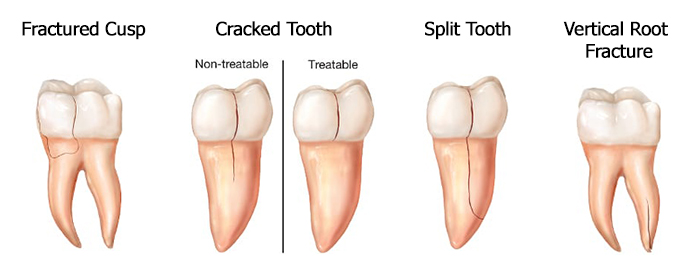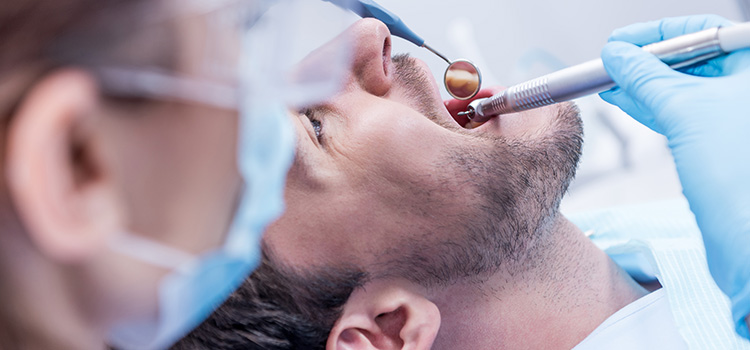What To Do For A Cracked Tooth?
3rd May 2020

For some, it's as dramatic as a soccer ball to the face. Others are surprised by a sharp snap when they bite into their lunch, feel their tongue drawn to a tooth, or notice an odd line in the mirror. If you suspect you have a cracked tooth, you may need to take immediate action to avoid further tooth damage.
Knowing what to do about your cracked tooth can limit discomfort, damage to your oral health, and money down the line. If left untreated, cracked tooth issues tend to worsen rather than improve.
Keep reading to learn about the symptoms, causes, and types of cracked teeth. We'll also explore how cracked teeth are diagnosed and treated. Armed with this information, you can safeguard your oral health from this common dental issue.

The Types of Cracked Teeth
According to the American Association of Endodontists, cracked teeth fall into one of the following categories.
Craze lines:
When tiny cracks affect tooth’s enamel (this forms a tooth's hard outer coating) but don't penetrate the tough dentin (this forms the second layer), the damage is called craze lines. They're common, painless, and not a medical concern. However, they can be a cosmetic issue.
Related Article: Exposed Dentin: Causes and Treatment
Fractured cusp:
The pointed corners of teeth's chewing surfaces are called cusps. A crack that develops here is called a fractured cusp. This damage often occurs near an existing filling. Since it generally doesn't go deep enough to impact the pulp, the soft core of the tooth where nerves, blood vessels, and connective tissues are found, any pain is normally minimal.
Cracked tooth:
If a crack runs vertically down a tooth from its chewing surface, the diagnosis is a cracked tooth. Smaller cracks are normally fairly easy to fix, but the damage can progress if left untreated. Cracks that extend into the gum line are more serious, and prompt treatment is vital in order to save the tooth.
Split tooth:
A broken tooth can split into pieces because of a vertical crack that extends from the chewing surface to a place below the gum line. This is called a split tooth. While at least part of the tooth will likely be a lost, quick action may save some of it.
Vertical root fracture:
Vertical root fractures are stealthy. They start below the gum line at the root of the tooth, so they rarely offer much warning until the tooth or the surrounding tissue becomes infected. Teeth that suffer a vertical root fracture often require extraction.
Cracked Teeth Warning Signs
Some cracked teeth produce no symptoms and are only noticeable during a checkup. However, many cracked teeth will alert you to their presence. Common warning signs for cracked teeth include:
- Pain when chewing or biting (this symptom may be intermittent)
- Sensitivity to hot or cold temperatures, including foods and liquids
- Swelling of nearby gums
If you suspect you have a cracked tooth, see your dentist as soon as possible. The situation is especially urgent if you are in pain or the tooth is severely cracked. Delaying treatment can increase your risk for complications like infections and make it more difficult to save an endangered tooth.

Common Causes of Cracked Teeth
The causes of cracked teeth are both varied and numerous. Here are some common causes.
Bruxism:
People with bruxism habitually grind their teeth. This puts a massive amount of pressure on the teeth. When left untreated, bruxism can erode the tooth structure and set the stage for cracked teeth and other dental damage.
Related Article: Is Teeth Bruxism Hereditary?
Tooth decay:
Tooth decay eats away at tooth enamel, creating cavities and weakening tooth structure. If not addressed, this can lead to cracked teeth and tooth loss.
Gum disease:
Common and largely preventable, gum disease is associated with red, swollen gums that bleed easily. However, gum disease can also trigger bone loss, which can leave the roots of your teeth more vulnerable to fracture.
Bite problems:
A misaligned bite can cause tooth wear and other issues that weaken the teeth.
Large fillings and restorations:
While fillings and restorations can save a tooth, they don't always restore the tooth’s strength. This could cause a tooth to weaken so much it cracks.
Accidents:
A sudden blow to the face or jaw can cause a cracked tooth.
Hard objects:
Chewing on items like pencils, ice, bones, hard candy, hard foods, fruit pits, popcorn kernels or fingernails can trigger a crack in a vulnerable tooth.
Temperature changes:
Exposing your teeth to dramatic temperature changes can leave you with a cracked tooth.
Age:
Teeth aren't immune to age. As people get older, the damage from everyday wear and tear accumulates while the nerves inside teeth shrink. This combination leaves older adults more likely to experience damage but less likely to notice it.
What To Do For A Cracked Tooth

Diagnosing a Cracked Tooth
While a severely cracked tooth can be clearly identified, early diagnosis of a cracked tooth can be tricky. After all, symptoms can be absent or intermittent, and cracks often don't show up on X-rays.
If a cracked tooth isn't immediately apparent, your dentist can use a variety of techniques to identify it. These methods include asking about your dental history and eating habits and visually examining your teeth and gums. They may ask you to bite down to see if it triggers pain, probe your gums to identify tender, inflamed areas, or feel for a crack by running a tool called a dental explorer over the surface of your teeth. Alternatively, they may apply a dental dye to your teeth, which will make the crack easier to spot.
Your dentist can diagnose and offer some form of treatment for a cracked tooth. However, if the crack has damaged the tooth's pulp or roots, you may be referred to a specialist for endodontic treatments. Endodontists are experts in treating a tooth's interior structures.
Treatment Options for Cracked Teeth
While broken bones will knit together with time, cracked teeth do not completely heal. Ultimately, the treatment depends on the type of cracked tooth, your symptoms, and the location and severity of the damage. There are many treatment options for cracked teeth:
No Treatment:
If the cracks are small, superficial, painless, and unlikely to spread, no treatment is medically necessary. Note: Only a dentist can decide if no treatment is the best route.
Mouthguards:
For patients battling bruxism, a mouthguard can protect the teeth from further damage from teeth grinding. Since failure to address your bruxism can shorten the lifespans of any other treatments, it's important to ask a dentist if a mouthguard could benefit you.
Bonding:
For minor tooth cracks, bonding (which involves filling the crack with a tooth-colored plastic resin) can restore the tooth's functionality and appearance.
Veneers:
When superficial cracks detract from the look of your smile, a veneer for the surface of the tooth may be ideal. A veneer is a thin layer of porcelain that attaches to the front of the tooth. It’s a quick fix for a cosmetic issue.
Fillings:
Cracks that develop near existing fillings can often be repaired by replacing the filling.
Crowns:
A crown is a cap that encases a tooth and restores its strength and functionality. This repair is often used for more significant cracks.
Root Canals:
If a crack extends deeply enough to impact the tooth's pulp, root canal treatment may be necessary. Performed by either a dentist, oral surgeon, or endodontist, a root canal removes the damaged pulp and reinforces the tooth's integrity. The procedure can also help reduce the chances of infection.
Extractions:
A tooth extraction removes the damaged tooth.
Keep the cracks out of your smile
Ignoring suspicions of a cracked tooth can make a bad situation worse, so call your dentist as soon as possible if you experience symptoms. Report symptoms such as pain, swelling, or crack visibility to your dentist's office when you request an appointment.
If you suffer from bruxism and worry it raises your risk for cracked teeth and other dental issues, Pro Teeth Guard offers custom-fit mouthguards online for an affordable price. Each night guard is created in a professional dental lab using professional materials and processes, so it's effectively the same quality of a dentist mouthguard for a lower cost. We offer several different options, so it's easy to choose the right mouthguard for your needs.
Related Articles:

- Most Popular
- Hard Outside, Soft Inside
- 2MM Thick
- Moderate / Heavy

- Most Durable
- Hard Materials
- 1.5MM Thick
- Heavy / Severe

- For Day Time Use
- Thin, Barely Visible
- 1MM Thick
- Light / Moderate

- For Clenching
- Flexible & Soft
- 1.5MM Thick
- Light / Moderate

